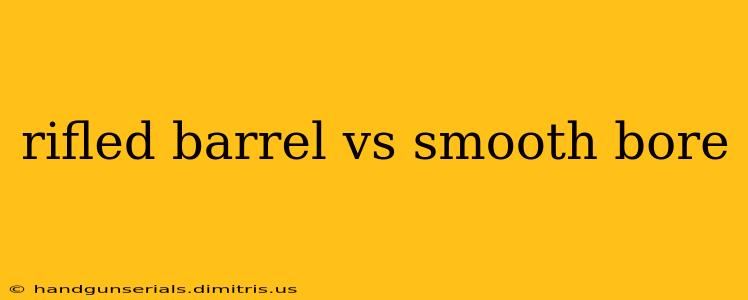Choosing between a rifled barrel and a smoothbore barrel depends heavily on your intended use. While both are used in firearms, their fundamentally different designs lead to drastically different projectile behavior and applications. This comprehensive guide will delve into the key distinctions, highlighting the advantages and disadvantages of each.
Understanding Rifling: The Key Difference
The core difference lies in the barrel's interior. A rifled barrel features spiraling grooves cut into its bore. These grooves impart spin to the projectile as it travels down the barrel. A smoothbore barrel, conversely, lacks these grooves; its bore is a straight, cylindrical channel. This simple distinction has profound implications on accuracy, range, and overall functionality.
Rifled Barrels: Accuracy and Range
Rifled barrels are the dominant design in modern firearms, particularly for long-range accuracy. The spin imparted to the projectile, also known as rifling twist, creates gyroscopic stability. This stability prevents tumbling, allowing the bullet to maintain a consistent flight path over longer distances. This leads to several key advantages:
Advantages of Rifled Barrels:
- Increased Accuracy: The superior stability translates directly to improved accuracy, making rifled barrels ideal for target shooting, hunting, and military applications.
- Extended Range: The stable flight path allows for longer effective ranges compared to smoothbore counterparts.
- Higher Velocity: Depending on the cartridge and rifling design, rifled barrels can sometimes achieve higher projectile velocities.
- Greater Penetration: The focused energy of a spinning projectile results in increased penetration power.
Disadvantages of Rifled Barrels:
- More Complex Manufacturing: Rifling requires more complex manufacturing processes, resulting in higher production costs.
- Less Versatile Ammunition: Rifled barrels are designed for specific types of projectiles (bullets) with features that engage the rifling. This makes them less versatile regarding ammunition choice.
- Increased Barrel Wear: The spinning projectile can cause slightly more wear on the barrel's rifling over time.
Smoothbore Barrels: Shot and Simplicity
Smoothbore barrels have been used for centuries and remain relevant in specific contexts. Their primary advantage lies in their simplicity and suitability for firing projectiles like shot.
Advantages of Smoothbore Barrels:
- Simplicity and Cost-Effectiveness: Smoothbore barrels are simpler and cheaper to manufacture than rifled barrels.
- Versatile Ammunition: They can fire a wider range of projectiles, including shot, slugs, and some specialized rounds. This versatility makes them popular for shotgun applications.
- Less Barrel Wear (Generally): While shot can cause erosion, the nature of the projectiles tends to distribute wear more evenly than a spinning bullet.
Disadvantages of Smoothbore Barrels:
- Lower Accuracy: The lack of rifling results in lower accuracy, particularly at longer ranges. Projectiles are susceptible to wind drift and tumbling.
- Limited Range: Effective range is considerably shorter compared to rifled barrels.
- Lower Velocity (Generally): Smoothbore barrels tend to produce lower projectile velocities.
Conclusion: Choosing the Right Barrel
The choice between a rifled barrel and a smoothbore barrel is not a matter of one being inherently "better." The optimal choice depends entirely on the intended use. Rifled barrels excel in applications demanding accuracy and range, while smoothbore barrels provide simplicity and versatility, particularly for shotgun applications. Understanding these fundamental differences is crucial for making an informed decision based on your specific needs and preferences.

